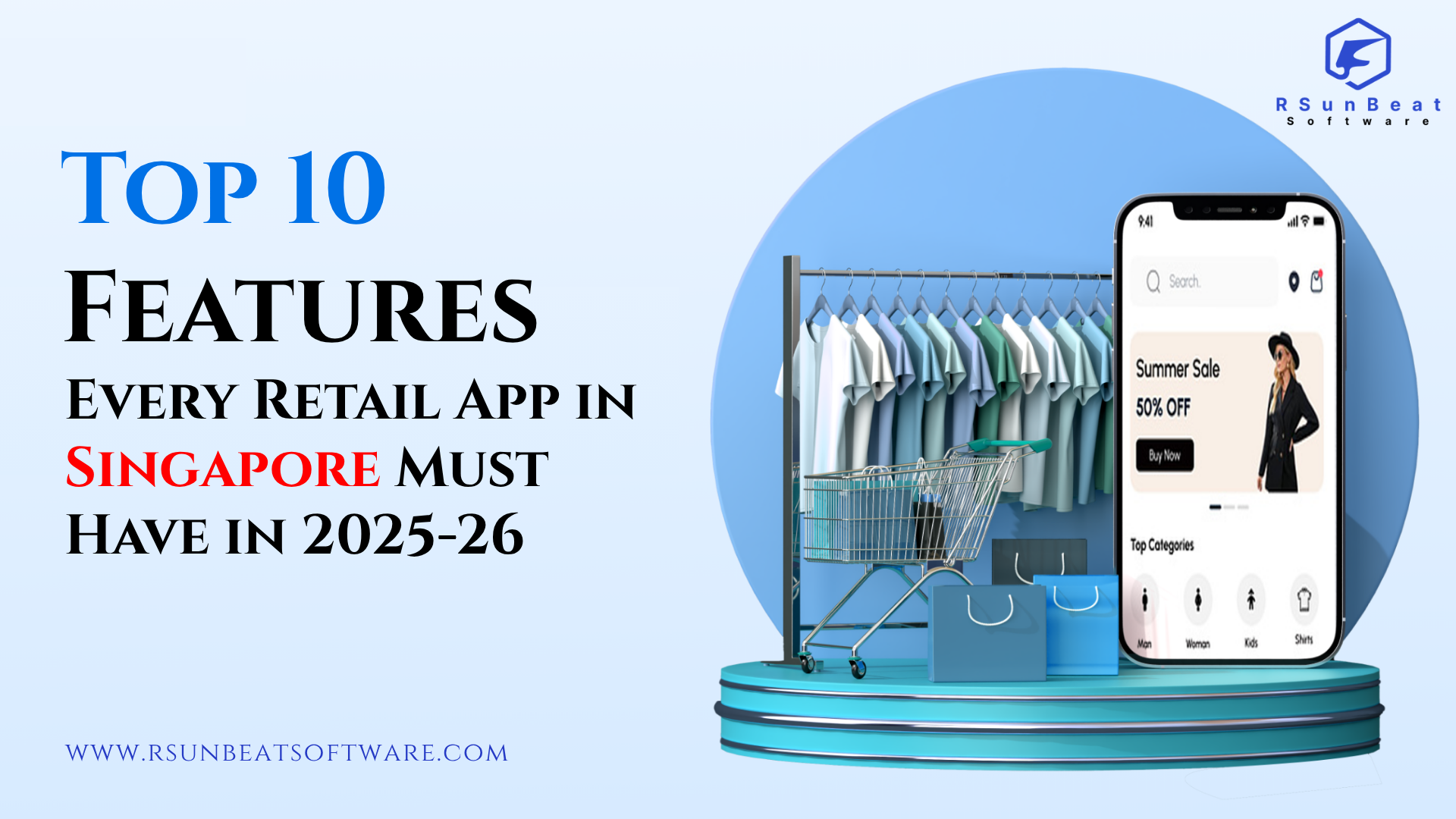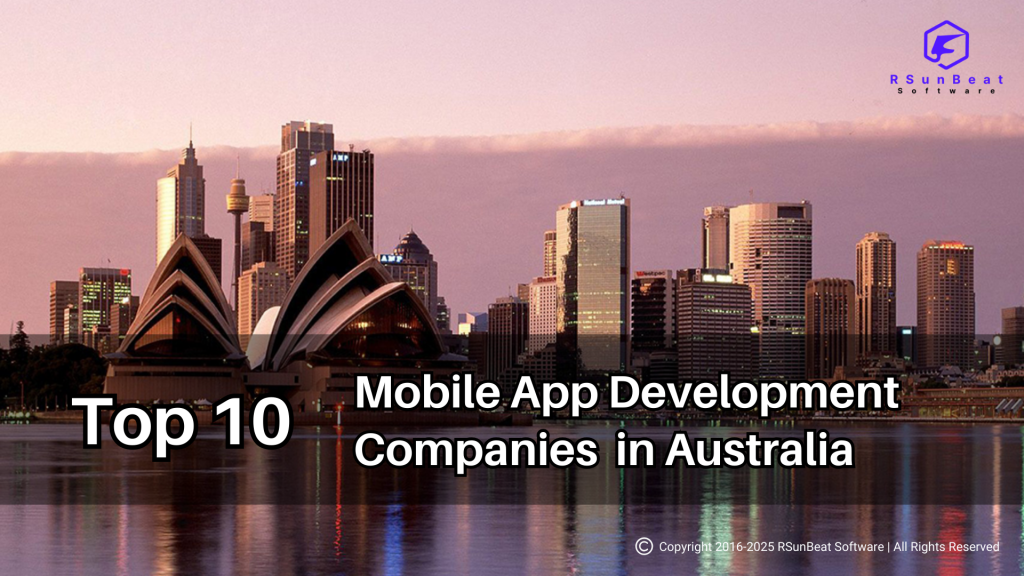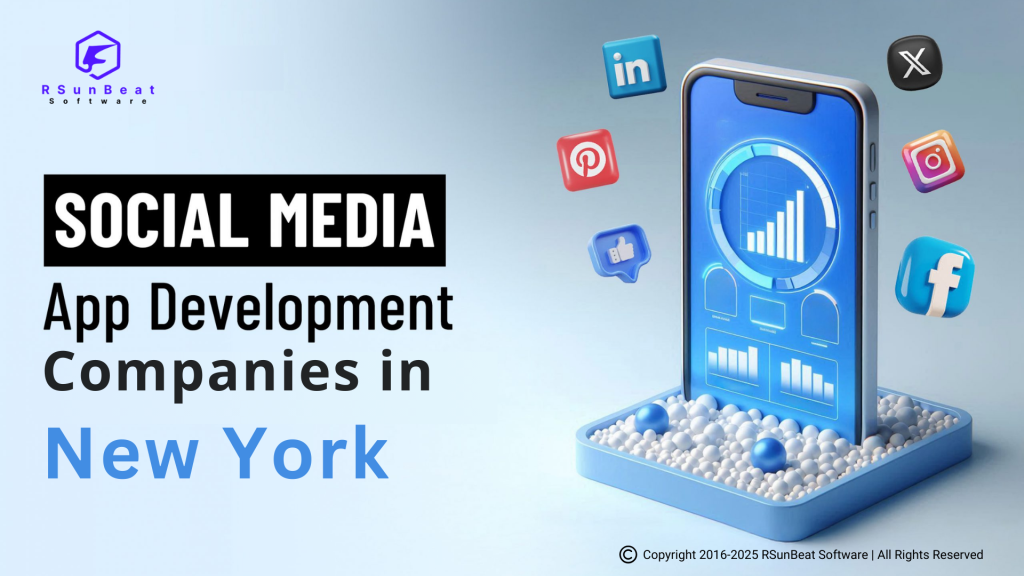
Top 10 Features Every Retail App in Singapore Must Have in 2025–26
In Singapore’s fast-evolving mobile commerce market, 2025–26 will mark a turning point. Consumer expectations are rising: faster checkouts, seamless omnichannel experiences, AR try-ons, and highly personalized content. For retail app development Singapore-based brands, or eCommerce teams wanting to serve Singapore and APAC markets, understanding which features matter most is critical. RSunBeat Software has been helping clients build custom retail apps, and from those experiences plus market trends, here are the top 10 retail app features you must include to stay competitive.
The Singapore Retail Tech Landscape
-
Mobile commerce in Singapore has been steadily growing, supported by high smartphone penetration and widespread adoption of e-wallets like PayNow, GrabPay, etc. Industry reports show over 70-80% of online shoppers now use mobile devices for at least part of their purchase journey.
-
Hybrid shopping behaviour is strong: browsers start on app or web, then pick up in-store, or vice versa. So omnichannel shopping experience is no longer optional. Retailers must sync POS, app, and web data.
-
Recent trends: AR/VR product previews in furniture, cosmetics; AI-powered product recommendations; demand for offline / PWA fallback in poor or intermittent connectivity areas; and very high expectations on security & privacy (PDPA in Singapore, GDPR relevance for overseas customers).
Top 10 Features Every Retail App Needs in 2025–26
Below are the feature set your retail app in Singapore (or targeting Singapore & APAC) should include. Each includes what it is, why it matters, and implementation ideas.
1. Intuitive Mobile UI/UX
What it is:
A design that puts user ease first: quick navigation, fast load times, accessible fonts, clean layout, minimal friction during onboarding and checkout.
Why it matters:
Mobile commerce Singapore 2025 demands high standards. Slow or confusing apps see high drop-off. Good UX increases retention and conversion rates significantly.
Implementation idea:
Use native-style elements (or React Native/Flutter) for smooth transitions. Test on real devices (low-end phones common in APAC). Incorporate accessible design (font sizes, contrast). Use skeleton loaders while waiting for data.
2. AI-Powered Personalization
What it is:
Systems that learn user preferences, browsing & purchase history to suggest products, adjust UI content, offer promotional offers tailored to each user.
Why it matters:
Users expect personalized recommendations. Personalized content tends to drive higher engagement, higher average order value (AOV), and repeat purchases.
Implementation idea:
Integrate ML models or third-party personalization platforms. For example, “Customers also viewed,” “You might like,” dynamic banners. Monitor behavior in early releases (MVP) to refine prediction algorithms.
3. Seamless & Secure Mobile Payments
What it is:
Support for local Singapore payment options (PayNow, GrabPay, etc.) plus global ones. Secure payment gateway integration with encryption, biometric auth, etc.
Why it matters:
Payment friction is one of the biggest drop-off points. Also, consumers trust apps that are secure and local-market aware.
Implementation idea:
Use PCI-DSS compliant gateways. Support latest mobile wallet APIs. Allow saving of payment methods with strong auth. Enable two-factor or biometric login for transactions.
4. Omnichannel Sync (POS, Web, App, In-Store)
What it is:
Unified inventory, order, customer data across channels: app, website, physical store, etc.
Why it matters:
Customers may start on app, finish in store, or check inventory online then buy offline. Without sync, overselling, stock mismatches, returns, and bad experiences happen.
Implementation idea:
Use headless commerce architecture or unified backend. Integrate POS systems through APIs. Real-time inventory synchronization. Offline detection and handling.
5. Real-Time Inventory & Order Tracking
What it is:
Visible stock availability in app; accurate order tracking; push notifications on order status, shipping, delivery.
Why it matters:
Transparency increases trust and reduces support tickets. Real-time info prevents negative comments about “item out of stock” or delayed deliveries.
Implementation idea:
Connect with logistics partners via APIs. Use push notifications for key order milestones. Dashboard for internal tracking. Use queueing or websocket for live updates.
6. AR Product Visualization
What it is:
Augmented Reality (or 3D previews) so customers see how products look in physical space (furniture, fashion, accessories).
Why it matters:
AR reduces uncertainty, decreases returns, improves shopping experience. It also gives standout differentiation in competitive markets.
Implementation idea:
Use ARKit (iOS) or ARCore (Android), or WebAR for PWA. Light 3D models optimized for mobile. Offer “view in my room” type functionality. Shadow/light matching helps realism.
7. Loyalty & Reward Programs
What it is:
Features like reward points, tiers, subscriptions, gamification (badges, streaks).
Why it matters:
Customer retention is more cost-efficient than acquisition. Loyalty programs increase repeat orders and can strengthen brand affinity.
Implementation idea:
Design points or tier system. Offer app-exclusive rewards. Use push notifications or in-app messaging for reminders and rewards expiry. Subscription models for frequent buyers.
8. Push Notifications & In-App Messaging
What it is:
Timely messages: order updates, abandoned carts recovery, promotions, personalized reminders.
Why it matters:
Keeps customers engaged. Recovers lost sales. Drives promotional campaigns.
Implementation idea:
Segment users (new, returning, VIP). Use AB testing for message timing and content. Respect local laws / permissions. Localize messages to Singapore or APAC audiences.
9. Performance Analytics Dashboard
What it is:
Backend dashboards showing metrics: retention, conversion funnels, user behavior, drop-off points.
Why it matters:
Data-driven decisions are vital. Without analytics you can’t optimize features or marketing spend.
Implementation idea:
Integrate tools like Firebase Analytics, Mixpanel, or Amplitude. Build custom dashboards. Monitor KPIs such as “time to purchase,” “cart abandonment,” “session length.”
10. Security, Compliance & Data Protection (PDPA / GDPR)
What it is:
User data handling, secure login, encryption, compliance with Singapore’s PDPA and international standards if relevant (GDPR for EU users).
Why it matters:
Privacy violations can lead to fines, reputational damage. Singapore users are increasingly sensitive to data breaches.
Implementation idea:
Implement multi-factor authentication, secure API practices. Conduct regular penetration testing. Clear privacy policy. Opt-in consent flows. Data residency if needed.
Technology Recommendations
To build and maintain such feature-rich retail apps, choosing the right stack matters.
-
Frontend: Flutter or React Native for cross-platform apps; React / Next.js for web/PWA.
-
Backend: Node.js, Python (Django / FastAPI).
-
Real-time features: WebSockets or services like Firebase Realtime / Firestore.
-
Search & product discovery: Elasticsearch or Algolia.
-
Infrastructure: AWS, GCP, or Azure for scalabilty. Use serverless where suitable.
-
For integration: Shopify, WooCommerce, or fully custom CMS depending on use-case.
Use microservices pattern for modularity. Headless commerce helps decouple UI & backend — enabling more flexible omnichannel deployment.
Cost & Timeline Estimates
| Phase | Scope | Estimated Cost (USD) | Timeline |
|---|---|---|---|
| MVP Version | Basic catalog, login, payment integration, basic recommendation engine | $15,000-$25,000 | 8-12 weeks |
| Growth Version | Add loyalty, AR preview, real-time inventory sync, omnichannel POS integration | $25,000-$45,000 | 3-5 months |
| Enterprise / Full Scale | Custom architecture, advanced analytics, subscription models, global/local compliance, high-volume support | $45,000+ | 6-12 months |
Costs vary based on feature complexity, integrations, UX design requirements, and support needed post-launch.
Case Example / Mini Case Study
RSunBeat Software recently worked with a fashion boutique in Singapore (anonymized) to build a custom retail app with AI personalization + loyalty features.
-
Challenge: Low repeat purchase rates; customers dropping off during checkout; minimal engagement with promotions.
-
Solution: Integrated personalized product recommendations, loyalty & rewards tiers, and simplified checkout with PayNow & GrabPay integration.
-
Outcomes after 3 months:
-
Repeat purchase rate increased by ~30%
-
Cart abandonment reduced by ~25%
-
User engagement (time per session) rose by ~20%
-
Checklist for Product Owners
Here’s a copyable checklist to evaluate retail app features:
-
Mobile-first design with fast load times (≤3 sec)
-
Secure, multi-wallet payment options (PayNow, GrabPay, Apple/Google Pay)
-
AI-based personalized recommendations
-
Omnichannel integration (POS, web, app)
-
Real-time inventory & order tracking
-
AR product views or 3D try-ons
-
Loyalty / subscription / gamification programs
-
Push notifications / in-app messaging with segmentation
-
Performance analytics dashboard with key metrics
-
Strong security & compliance (PDPA/GDPR, secure auth)
Let’s Connect!
Retail app development Singapore 2025–26 is not about having more features — it’s about having the right features. Those apps that deliver on personalization, secure payments, fast performance, omnichannel experience, and privacy will lead the market.
At RSunBeat Software, we specialize in custom retail app development that includes these features and more. Whether you’re launching your first MVP or scaling an enterprise solution, we can help you build with quality, compliance, and future readiness in mind.

Testimonials ~
What Our Clients
Are Saying
Your trust drives our passion. Here’s how we’ve helped businesses like yours thrive with tailored solutions and unmatched support.

Hussein Termos
CEO
“RSunBeat Software is a top-tier web development company for the real estate industry. They delivered a user-friendly, customized platform that met our needs perfectly. Their innovative solutions, on-time delivery, and excellent support made the process seamless. Highly recommended for exceptional development services!”

James Carten
Founder & CEO
“Before working with RSunBeat Software, our real estate business faced issues with unreliable mobile apps, poor user experiences, and missed deadlines. RSunBeat delivered a seamless, high-performing app with excellent functionality, intuitive design, and timely execution, transforming our operations. Their expertise and dedication make them a trusted partner.”

Darla Shewmaker
VP of Marketing
“RSunBeat Software developed a great, user-friendly mobile app that exceeded our expectations. The team was extremely professional, kept us updated throughout the process and completed the work on time. Their expertise and dedication made the whole project seamless. We highly recommend RSunBeat for their great work and reliability!”

Nicholas Toh
Project Manager
“RSunBeat Software delivered an amazing web and app development experience. Their team was highly professional, detail-oriented, and dedicated to bringing our vision to life. The final product was seamless, user-friendly, and exceeded our expectations. We highly recommend them for top-notch development services!”
Our Technology Experts
Are Change Catalysts
Mail to Our Sales Department
info@rsunbeatsoftware.com
Our Skype Id
Rsunbeat Software


